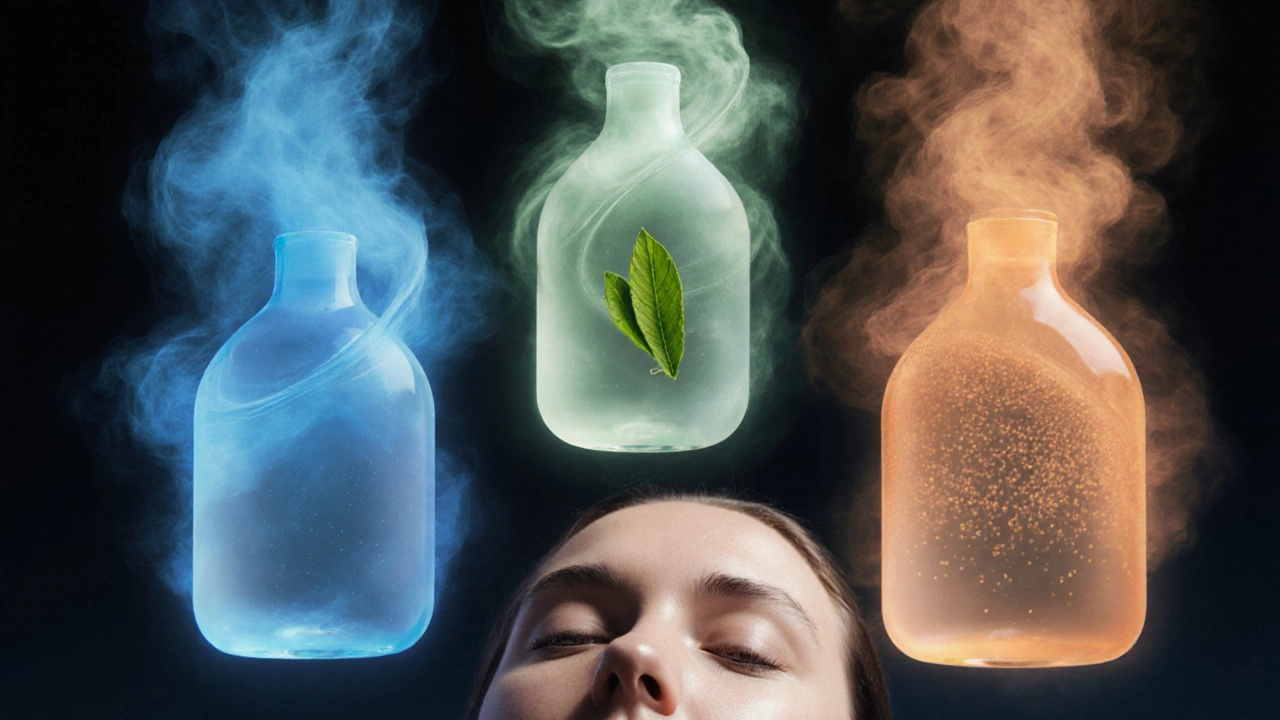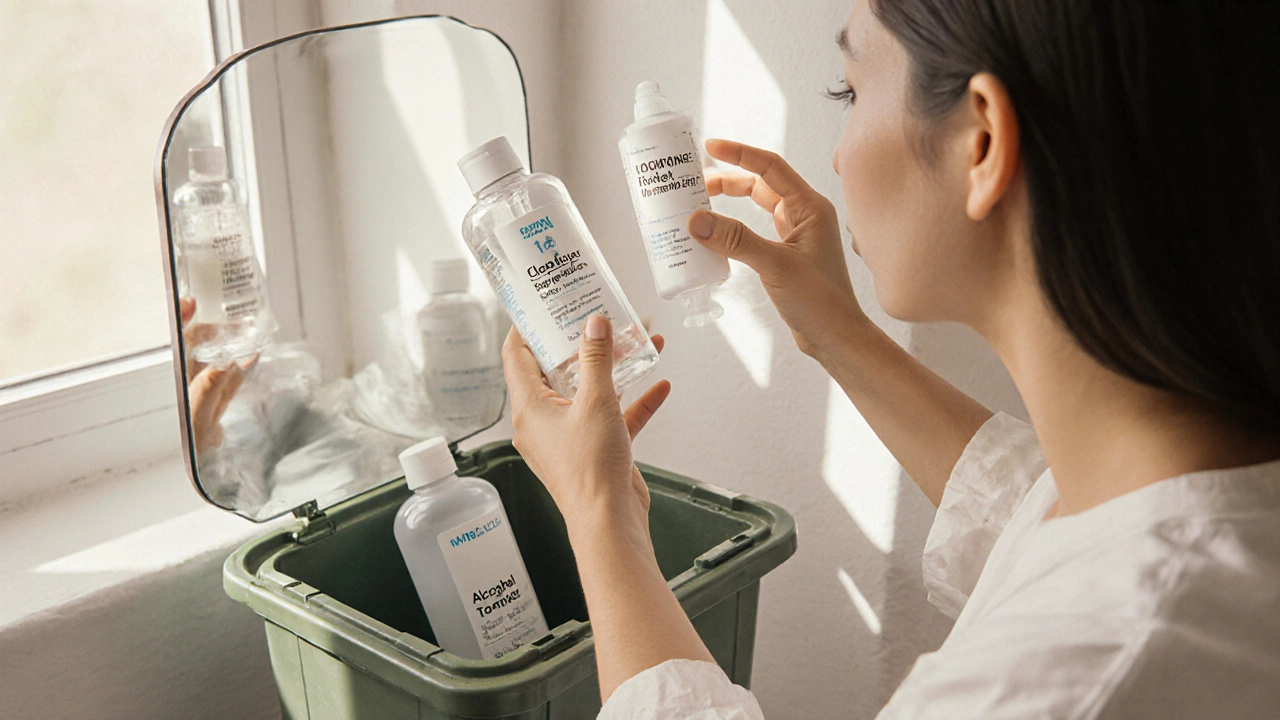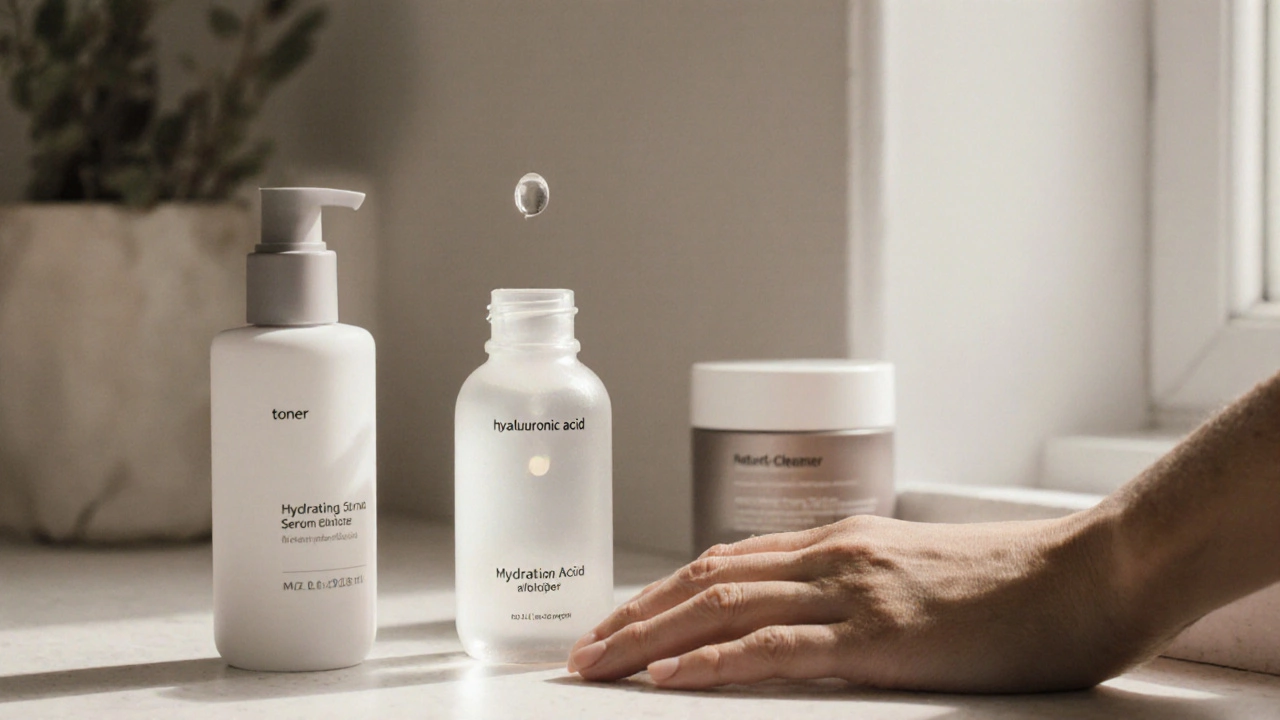For years, toner has been a staple in skincare routines-promised to shrink pores, balance pH, and prep skin for better absorption. But now, with cleaner formulas, minimalist routines, and more understanding of skin biology, people are asking: Is toner necessary?
What even is toner, really?
Toner is a liquid product applied after cleansing and before serums or moisturizers. Historically, it was an alcohol-heavy solution designed to strip away leftover oil and dirt. That’s why older generations associate toner with that tight, dry feeling after washing your face. But today’s toners? They’re completely different.
Modern toners fall into three main types:
- Hydrating toners - packed with ingredients like hyaluronic acid, glycerin, or aloe vera to add moisture.
- Exfoliating toners - contain low-dose AHAs (like lactic acid) or BHAs (like salicylic acid) to gently remove dead skin cells.
- Soothing toners - use ingredients like centella asiatica, chamomile, or niacinamide to calm redness or irritation.
So when someone says "toner," they might mean something that dries your skin out-or something that acts like a mini hydrating mist. Context matters.
Why do people think toner is essential?
The idea that toner is non-negotiable comes from old-school skincare marketing. In the 1980s and 90s, brands sold toner as a "second cleanse"-implying your face wash wasn’t enough. That made sense back then, because cleansers were harsher and often left residue.
Today’s cleansers are far more advanced. Gentle foams, oil-based cleansers, and micellar waters do a thorough job without stripping your skin. If you’re using a modern cleanser and rinsing well, your skin doesn’t need a toner to "finish" the job.
Also, the myth that toner "tightens pores" is misleading. Pores don’t have muscles-they can’t open or close. What toner can do is temporarily make pores look smaller by hydrating the skin around them. That’s not the same as shrinking them.
Who actually benefits from toner?
Not everyone needs it. But some skin types and concerns get real value from it.
If you have:
- Oily or acne-prone skin - an exfoliating toner with salicylic acid (like Paula’s Choice 2% BHA) can help prevent clogged pores without the dryness of harsh scrubs.
- Dry or sensitive skin - a hydrating toner with ceramides or panthenol can add a layer of moisture before your serum, helping your skin retain water.
- Uneven texture or dullness - a gentle AHA toner used 2-3 times a week can brighten skin and improve product absorption.
For most people with normal, balanced skin? A good cleanser and moisturizer are enough. Adding toner won’t hurt-but it won’t make a noticeable difference either.

What happens if you skip toner?
Nothing bad. Seriously.
There’s no scientific evidence that skipping toner causes acne, aging, or skin damage. In fact, a 2023 study in the Journal of Clinical and Aesthetic Dermatology found that people who used only a cleanser and moisturizer had just as healthy a skin barrier as those who added toner, serum, and essence.
What you might notice:
- Your skin feels fine-maybe even better if you were using an alcohol-based toner that irritated you.
- Your serums and moisturizers absorb just as well.
- You save money and simplify your routine.
Some people feel like their skin "needs" toner because they’ve used it for years. That’s habit, not necessity. Your skin doesn’t remember what you used last week.
When toner might do more harm than good
Not all toners are created equal. Some still contain:
- Alcohol denat. (drying, irritating)
- Fragrance (a top cause of contact dermatitis)
- Essential oils (can trigger sensitivity, especially on the face)
If you’re using one of these, you’re not improving your skin-you’re disrupting your barrier. That can lead to redness, flaking, or increased oil production as your skin tries to compensate.
Check the ingredient list. If the first three ingredients are water, alcohol, and fragrance? Put it down. You don’t need that.

How to decide if toner is right for you
Ask yourself these questions:
- Do I have a specific skin concern (acne, dullness, dehydration) that my current routine isn’t fixing?
- Am I using a toner that’s formulated for my skin type (hydrating for dry, exfoliating for oily)?
- Do I feel any improvement after using it for 4-6 weeks?
- Is it adding time, cost, or complexity to my routine without clear benefit?
If you answered "no" to most of those, skip it.
If you answered "yes" to one or two, try a simple, fragrance-free toner with one active ingredient (like hyaluronic acid or niacinamide) for 30 days. Then decide.
What to use instead of toner
You don’t need toner to hydrate, exfoliate, or soothe your skin. There are better, more targeted options:
- For hydration - use a hydrating serum with hyaluronic acid or a lightweight gel moisturizer.
- For exfoliation - use a chemical exfoliant (like a 5% lactic acid serum) 2-3 times a week, not daily.
- For soothing - try a calming moisturizer with centella asiatica or colloidal oatmeal.
These products deliver higher concentrations of actives and don’t rely on evaporation or temporary effects.
The bottom line
Is toner necessary? No. Not for most people.
It’s not a skincare essential like sunscreen, cleanser, or moisturizer. It’s an optional step-like adding a garnish to a meal that’s already perfectly cooked.
If you love the ritual of applying toner, if it makes you feel like your routine is "complete," go ahead. But don’t do it because you think your skin will fall apart without it.
Skincare isn’t about checking boxes. It’s about what your skin actually needs-and what you can sustain long-term.
Focus on gentle cleansing, daily sunscreen, and hydration. Skip the toner if it’s not helping. Your skin won’t miss it-and you’ll save time, money, and irritation.
Do I need toner if I have acne?
You don’t need toner for acne, but an exfoliating toner with salicylic acid can help if your current routine isn’t clearing clogged pores. It’s not a replacement for proven acne treatments like retinoids or benzoyl peroxide, but it can support them. Avoid alcohol-based toners-they’ll dry out your skin and make breakouts worse.
Can toner replace a cleanser?
No. Toner is not a cleanser. It doesn’t remove makeup, sunscreen, or oil the way a proper cleanser does. Even if it feels like it’s "cleaning," it’s just adding moisture or mild exfoliation. Always cleanse first, then use toner if you choose to.
Is toner good for sensitive skin?
Only if it’s specifically formulated for sensitivity-free of alcohol, fragrance, and essential oils. Hydrating toners with ceramides or panthenol can help reinforce the skin barrier. But many toners trigger irritation. If your skin stings or turns red after use, stop immediately.
Should I use toner morning and night?
Only if you’re using an exfoliating toner with AHAs/BHAs-and even then, limit it to 2-4 times a week. Hydrating toners are safe for daily use, but they’re not essential. Most people do fine with just a morning and evening cleanser and moisturizer.
What’s the difference between toner and essence?
Toner is usually lighter and meant to prep the skin or deliver mild actives. Essence is thicker, more concentrated, and packed with ingredients like fermented extracts or peptides to target aging or hydration. Essences are closer to serums. You can use both, but you don’t need either.









